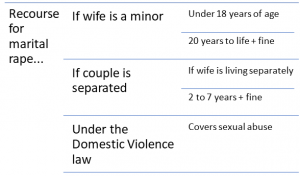[Trigger Warning: The following content contains information on domestic violence which some readers may find disturbing.]
Any woman can file a complaint and seek protection against domestic violence under the law, for herself and her child/children. The religion of the woman does not matter(( Mr. Ali Abbas Daruwala vs. Mrs. Shehnaz Daruwal 2018 (3) RCR (Criminal) 106.)) i.e. any woman, regardless of her religion or caste, can file a complaint against domestic violence.
Please keep in mind that if you decide to go to Court, you need to make sure that you had a domestic relationship and a shared household with the harasser. You can complain and seek protection in the following circumstances:
If you are married
If you are married, and are facing domestic violence from your husband or in-laws, you can file a complaint against them.
If you are divorced
If you are divorced, then depending on the facts of the case, you may or may not be granted protection and relief. Some situations are:
- If you face violence before the divorce, you can file a complaint, as you had a domestic relationship with your husband/in-laws at the time the violence took place.(( Juveria Abdul Majid Patni v. Atif Iqbal Mansoori (2014) 10 SCC 736.))
- If you face violence after the divorce, you will have to prove that a domestic relationship was existing between you and the harasser at the time when the domestic violence took place. In some cases, even if you cannot prove the domestic relationship, the Court may hear you out. For example, if you and your husband continued to take care of your child together after getting divorced, and you faced harassment in the course of that.
- If you have initiated divorce proceedings at some point, but did not end up getting divorced, you can file a complaint if you face any domestic violence.(( Prakash Nagardas Dubal-Shaha v. Meena Prakash Dubal Shah (2016) 13 SCC 277.))
If you have deserted your husband
If you have left your husband because he was subjecting you to domestic violence, by beating you, verbally abusing you, etc., you can file a complaint against him for domestic violence. If you have left your husband for any other reason, then you cannot file a case. For example, if you left your husband because you wanted to live with another man, or because you wanted to live alone, then you cannot file a complaint under this law.(( Sejal Dharmesh Ved v. The State of Maharashtra and Ors. 2014 ALL MR (Cri) 636.))
If you are judicially separated
If you are judicially separated from your husband and you have faced domestic violence from him or your in-laws either before or after the separation order, you can file a complaint against the harassers.(( Krishna Bhatacharjee v. Sarathi Choudhury (2016) 2 SCC 705.))
If you are in a live-in relationship:
If you are in a live-in relationship, you can file a complaint against your partner if you face domestic violence.(( Velusamy v. D. Patchaiammal (2010) 10 SCC 469.)) In some cases, you can also file a complaint if you are now separated but faced violence when you were still with your partner.(( Reshma Begum v. State of Maharashtra & Anr. 2018 SCC OnLine Bom 1827.))
If you are a widow
If you continue to live with your in-laws after the death of your husband, it is viewed as a domestic relationship, as your relationship with your in-laws does not come to an end with the death of your husband. In such a case, if you face domestic violence, you can file a complaint against your in-laws.(( Jitendrabhai Bhikhabhai Bhambaniya v. State of Gujarat, Criminal Revision Application/271/2016, Gujarat High Court.)) For example, if you are a widow who is being harassed by her mother-in-law, you can file a complaint against her.
Some states provide handbooks for ASHA workers where you can find more information on forms on violence and how to file a complaint to seek protection against domestic violence. For example, see this handbook published for ASHA in Chattisgarh, Delhi, Jharkhand, Madhya Pradesh and Uttarakhand.
